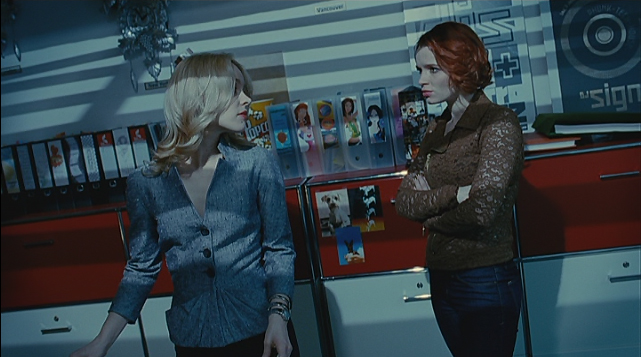, and how that informed Costner's own mentorship role to Pine's Jack Ryan in the new film.
has a good transcription of the press conference. Here are the related Costner excerpts:
Kevin, you were originally going to play Jack Ryan in The Hunt for Red October. I was wondering if you were already well versed by the time you came in to play the mentor role to Jack in this film? Kevin Costner: The mentor role is always that ‘what can you offer a younger man, what can you offer a younger woman.’ That thing is in your level of experience, and so that by definition is the mentor if you have a level of experience. If you read it on paper, that’s the role that was meant for me. It was inhabited perfectly. Chris did his role, and what I liked about it was that I wasn’t just a person at a desk on a phone going, “Get the hell out of there. What the hell are you doing? Well, you need to do it faster.” Kenneth was able to say, “Wait a second. I want to incorporate some of your skill set into this where even though I’m a stupid-visor (laughs), if you would, a supervisor here, that I could take the gloves off so to speak and become involved and bring a physical presence and team up with him at the right moment. I thought that was unusual for the mentor role. Usually they’re back in Washington or they’re in a big, giant control room. In this instance, we were always fairly close together and trying to sort it out a little bit together. And, as the movie progresses, you see that he just possesses a lot of intuitive skills, whether it’s being out of set, how to survive or to process a lot of information in a very quick way, which I actually asked him a couple of times to slow down, remembering that I’m in another century. (Laughter)
...
Mr. Costner, at the end of the film, you refer to Jack Ryan as something of a Boy Scout, which reminds me of a number of your most famous roles, perhaps specifically Elliot Ness. I was curious how does it feel to suddenly step into the Sean Connery role?
Kevin Costner: I think the smarter directors do this a lot of times. They’ll take a supporting role and they’ll put a leading man in it because they either know how to inhabit the screen or inhabit it and nowhere was it better than when Sean Connery came in and played the little Irish street cop and you realized how formidable he was. I remember telling Sean at the time, I said, “Sean, this has got enough meat on the bone that you could win the Academy Award.” And Brian (De Palma) could have easily cast any character actor to bring up that Irish brogue or whatever that you would do, but he said no. He went arguably to the biggest star, the biggest star I’ve ever worked with in my life as I think Sean Connery was, to play this. And I think what happens is then he just knows how to hold onto the screen. And so, I have a feeling that that might have been swirling around in this genius’ head over there with what he wanted to do with William Harper.
I love the way you talked about your character and that he was a mentor. Was it easier to mentor in 1984 than in 2014? Was 1984 an easier time for an old shoe to tell a new shoe what to do and what the pitfalls were?
Kenneth Branagh: I think if there’s openness of communication, then the timing doesn’t really matter. And sometimes the mentoring doesn’t really happen directly. It just happens intuitively. I certainly found that working with Kevin on this. There were a lot of things that went on. I was so grateful to have a master director on the set. There are just lots of moments where effortless…not advice…nothing so sort of obvious as advice, but just shared communication about things, a conversation about how a moment in a scene might go or how things might be approached which just came out of an honest collaboration.
If that honesty of communication exists, whether it’s 1984 or 2014, I think it’s quite marvelous actually. And watching these two together was great as well in terms of just when people trust each other and when they’re very good at what they do and when their egos are at the service of the better idea and what is right for the scene. When you see that kind of generosity at work, it really is a thrilling thing to be part of and actually that cuts across age. It doesn’t mean old or younger. I’ve learned a lot from people much younger than me as well as people much older than me. So I think it’s about honesty and generosity, and we were lucky to be in an atmosphere on this project across this table as it were where that was at work.
Who was your greatest mentor?
Kenneth Branagh: My greatest mentor was the guy who was the principal of the drama school I attended. For the first six or seven pictures I made, he was on the movie as the acting coach. To give you a quick example of what he did for me, he was a very sensitive English guy. We were making a film of Hamlet. I was doing the To Be or Not To Be soliloquy. I was very nervous. I said to him that day, “Look, this is the acting Olympics here. I’m doing the most famous speech in Western dramatic literature. If you have any notes for me, I’d like them very early on, please.” So we started doing it. I did Take 1. I said, “How was that?” and he said, “I don’t have anything to say.” I did Take 2 and Take 3 and he did not have anything to say. I said, “Look, I think I’m getting it. I’m going to call this a print very shortly.” He said, “I think you should do another one.” I said, “Do you have anything to say?” He said, “Not at the moment.” So we get to Take 6 and I said, “Hugh, I think we might have it. Do you have anything to say?” He said, “Well, yes, yes, yes. The rhythm of it, absolutely extraordinary. The understanding of the language, fantastic. The pacing of it, marvelous. The timing of it, really extraordinary.” I said, “What’s the problem?” He said, “I simply don’t believe a word you’re saying. I would have absolutely no sense of the man. It’s safe. It’s acting. It’s showing off. You really have to do another one.” So a guy with those balls that close to me, it was very helpful. He was my greatest mentor.
What about you, Kevin? Who was your greatest mentor?
Kevin Costner: I tell you, I think an honest exchange is never out of mode, and it will be just as practical in 1984 as in the year that we’re dealing with. This is a business that’s pretty interesting. Unlike a lot of businesses, you get up in the morning and you have breakfast with the people you work with all day. You have lunch with them and you have dinner with them. The nature of acting, if you think you put three minutes of film in the can a day, that means you’re spending an enormous amount of hours getting to talk about people’s lives and their families. There are a lot of things that go on, on a set.
In terms of mentorship, it was probably Sean. He was a leading man. He carries himself as a man. I remember a big scene with De Niro and everybody, and we were all talking, and he finally told me, (mimicking Connery’s accent) “Mr. Ness.” I said, “What?” He said, “Sit down.” And I said, “Sit down right now?” And he said, “Yes. Just sit. It’s going to be a long day.” He just talked about not artsy fartsy stuff. He talked about sometimes just practical shit, like “It’s going to be a long day. Sit down. You and I are going to sit here and we’re going to watch, and when it’s our turn, we’re ready.” So, what better advice could one man give another on something so practical that I hate to use.




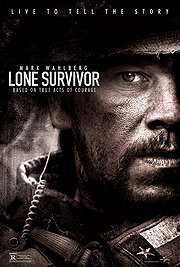 In 2011, we
In 2011, we  Kevin Costner, Kenneth Branagh, and Chris Pine conducted a press conference recently for Branagh's new film, Jack Ryan: Shadow Recruit, wherin Costner talked a lot about Sean Connery's role as mentor in Brian De Palma's The Untouchables, and how that informed Costner's own mentorship role to Pine's Jack Ryan in the new film.
Kevin Costner, Kenneth Branagh, and Chris Pine conducted a press conference recently for Branagh's new film, Jack Ryan: Shadow Recruit, wherin Costner talked a lot about Sean Connery's role as mentor in Brian De Palma's The Untouchables, and how that informed Costner's own mentorship role to Pine's Jack Ryan in the new film. 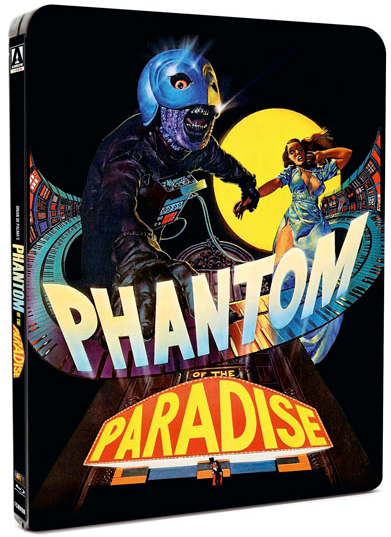 The not so bad news is that
The not so bad news is that 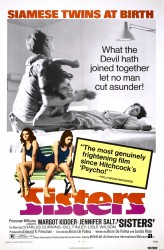 Brian De Palma's Sisters screened in Chicago last night as part of
Brian De Palma's Sisters screened in Chicago last night as part of 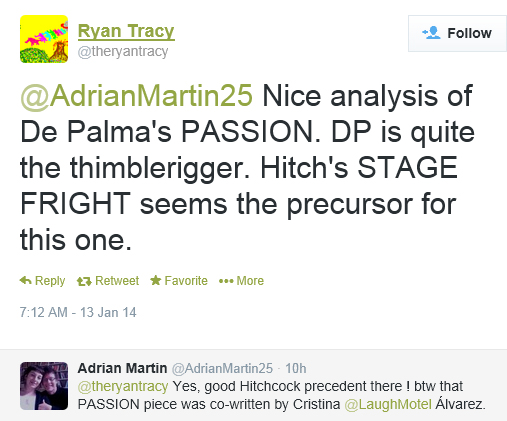
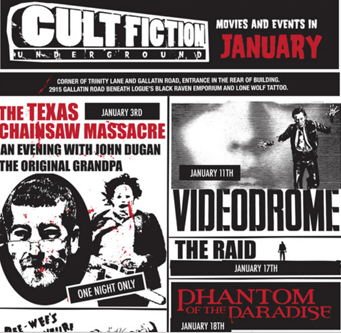 Brian De Palma's Phantom Of The Paradise, which turns 40 this year, is part of the January line-up at Nashville's
Brian De Palma's Phantom Of The Paradise, which turns 40 this year, is part of the January line-up at Nashville's 
